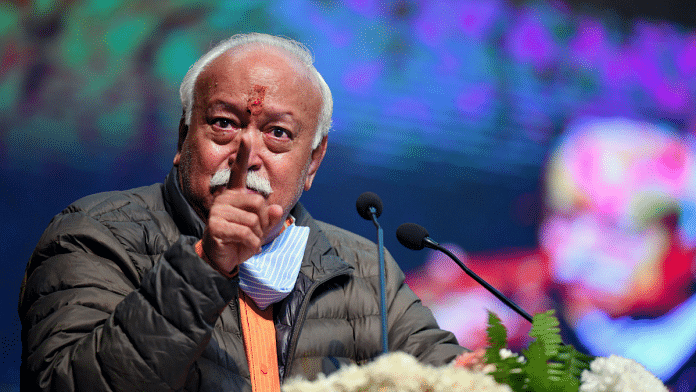When the Rashtriya Swayamsevak Sangh chief Mohan Bhagwat asserted in Nagpur last week that English’s importance for building a career is a myth, all I could hope for was that not a single person in India takes him seriously. Every Indian must read, write, and speak English, even if it’s the only language they learn in life. Unconditional support for the English language is not a sign of ‘colonial hangover’ — making it a matter of pride or looking down upon those who don’t know the language is. This unconditional support stems from the fact that I don’t see any other way I could have earned my way through for more than 15 years—or, as Bhagwat put it, have a ‘career’ today—if it hadn’t been for the English language. Am I an exception?
It’s one thing to argue against the belief that efficiency in the English language is the only way to build a career when factors such as our social and economic positioning determine whether we even have access to a job or not. But to wantonly dismiss the language’s importance as a myth shows a disconnect with Indian society’s hard truths.
The English language is the most powerful tool available to the India’s unemployed, marginalised, and non-English-medium youth to break out of the limitations and imprisonments that this country’s hierarchical society has imposed on them. The odds are stacked against them anyway, there is no need to trick them into giving up their chance of an easy livelihood or their dreams of upward social mobility.
A career in itself
From villages to small towns to big cities, English coaching institutes are a thriving industry in India. In 2006, soon after completing secondary school, I joined one such institute in Patna for a three-month course in ‘spoken English’. I wasn’t aware then what a life-changing decision it would prove to be.
Coaching institutes are merely a step in the right direction; at the end of the day, learning any language requires time and effort. There are no easy fixes for the sort of disconnect that comes from not knowing the language; there are definitely no comforting voices around to tell you that it’s okay if you don’t know the language, you will do just fine. Because three years later, when I got my first full-time job at a call centre in Noida, it was largely because I was able to speak two sentences in English during an interview that lasted less than two minutes. Proficiency in the English language opens many doors for you—not just career-wise. It gives you a bigger buffet to choose from. And it offers growth. Vertical growth. For me, it introduced me to a life in which I could earn my way and fund my course in journalism four years later.
I didn’t know what all opportunities existed for people like me who didn’t have any specific skill set, who knew only their native language to begin with. That may be my own limitation, but I didn’t hear Bhagwat list out in his speech the options and opportunities available for non-English-medium youth. He asked Indians not to run after public and private sector jobs but to start their own businesses. What are those businesses? Bhagwat doesn’t say. But I presume it’s not a business that involves new tech, computing, artificial intelligence, or one ambitious enough to go beyond the local market.
Also read: Golwalkar to Bhagwat, why RSS chiefs meet Muslim leaders — ‘De-Arabisation’ of Indian Islam
Painful and dangerous
Some of the dislike for the English language in the non-English-speaking groups stems from insecurity or inadequacy at not being able to comfortably navigate the English-speaking society. If you know the language, you flaunt it. If you don’t, you take the easy route of deriding the speaker and believing yourself as more ‘grounded’, in sync with the nation and its ‘tradition’.
English-medium schools are not only more costly, but can also instil a sense of fear and intimidation among parents and students. And so, Bhagwat’s rebuke of Indian parents not sending their children to non-English-medium schools can provoke a dangerous backsliding.
Mohan Bhagwat can promote the use of matrabhasha without pulling down the language of means and freedom and livelihood for Indians. Perhaps his exhortation should be aimed at those in power to encourage non-English literature and regularise jobs that don’t need the English language. He should call upon industry leaders and businesspersons to create openings with no English requirement at all. Until then, he should just let us speak the language, build our careers, and thank the Goddess of English who was once incarnated in Uttar Pradesh’s Banka district.
Views are personal.
(Edited by Humra Laeeq)



